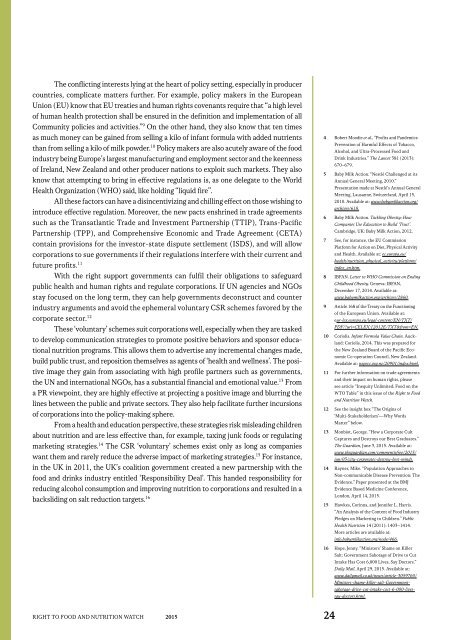RIGHT TO FOOD AND NUTRITION WATCH
1iNBHTY
1iNBHTY
You also want an ePaper? Increase the reach of your titles
YUMPU automatically turns print PDFs into web optimized ePapers that Google loves.
The conflicting interests lying at the heart of policy setting, especially in producer<br />
countries, complicate matters further. For example, policy makers in the European<br />
Union (EU) know that EU treaties and human rights covenants require that “a high level<br />
of human health protection shall be ensured in the definition and implementation of all<br />
Community policies and activities.” 9 On the other hand, they also know that ten times<br />
as much money can be gained from selling a kilo of infant formula with added nutrients<br />
than from selling a kilo of milk powder. 10 Policy makers are also acutely aware of the food<br />
industry being Europe’s largest manufacturing and employment sector and the keenness<br />
of Ireland, New Zealand and other producer nations to exploit such markets. They also<br />
know that attempting to bring in effective regulations is, as one delegate to the World<br />
Health Organization (WHO) said, like holding “liquid fire”.<br />
All these factors can have a disincentivizing and chilling effect on those wishing to<br />
introduce effective regulation. Moreover, the new pacts enshrined in trade agreements<br />
such as the Transatlantic Trade and Investment Partnership (TTIP), Trans-Pacific<br />
Partnership (TPP), and Comprehensive Economic and Trade Agreement (CETA)<br />
contain provisions for the investor-state dispute settlement (ISDS), and will allow<br />
corporations to sue governments if their regulations interfere with their current and<br />
future profits. 11<br />
With the right support governments can fulfil their obligations to safeguard<br />
public health and human rights and regulate corporations. If UN agencies and NGOs<br />
stay focused on the long term, they can help governments deconstruct and counter<br />
industry arguments and avoid the ephemeral voluntary CSR schemes favored by the<br />
corporate sector. 12<br />
These ‘voluntary’ schemes suit corporations well, especially when they are tasked<br />
to develop communication strategies to promote positive behaviors and sponsor educational<br />
nutrition programs. This allows them to advertise any incremental changes made,<br />
build public trust, and reposition themselves as agents of ‘health and wellness’. The positive<br />
image they gain from associating with high profile partners such as governments,<br />
the UN and international NGOs, has a substantial financial and emotional value. 13 From<br />
a PR viewpoint, they are highly effective at projecting a positive image and blurring the<br />
lines between the public and private sectors. They also help facilitate further incursions<br />
of corporations into the policy-making sphere.<br />
From a health and education perspective, these strategies risk misleading children<br />
about nutrition and are less effective than, for example, taxing junk foods or regulating<br />
marketing strategies. 14 The CSR ‘voluntary’ schemes exist only as long as companies<br />
want them and rarely reduce the adverse impact of marketing strategies. 15 For instance,<br />
in the UK in 2011, the UK’s coalition government created a new partnership with the<br />
food and drinks industry entitled ‘Responsibility Deal’. This handed responsibility for<br />
reducing alcohol consumption and improving nutrition to corporations and resulted in a<br />
backsliding on salt reduction targets. 16<br />
4 Robert Moodie et al., “Profits and Pandemics:<br />
Prevention of Harmful Effects of Tobacco,<br />
Alcohol, and Ultra-Processed Food and<br />
Drink Industries.” The Lancet 381 (2013):<br />
670–679.<br />
5 Baby Milk Action. “Nestlé Challenged at its<br />
Annual General Meeting, 2010.”<br />
Presentation made at Nestlé’s Annual General<br />
Meeting, Lausanne, Switzerland, April 15,<br />
2010. Available at: www.babymilkaction.org/<br />
archives/618.<br />
6 Baby Milk Action. Tackling Obesity: How<br />
Companies Use Education to Build ‘Trust’.<br />
Cambridge, UK: Baby Milk Action, 2012.<br />
7 See, for instance, the EU Commission<br />
Platform for Action on Diet, Physical Activity<br />
and Health. Available at: ec.europa.eu/<br />
health/nutrition_physical_activity/platform/<br />
index_en.htm.<br />
8 IBFAN. Letter to WHO Commission on Ending<br />
Childhood Obesity. Geneva: IBFAN,<br />
December 17, 2014. Available at:<br />
www.babymilkaction.org/archives/2860.<br />
9 Article 168 of the Treaty on the Functioning<br />
of the European Union. Available at:<br />
eur-lex.europa.eu/legal-content/EN/TXT/<br />
PDF/?uri=CELEX:12012E/TXT&from=EN.<br />
10 Coriolis. Infant Formula Value Chain. Auckland:<br />
Coriolis, 2014. This was prepared for<br />
the New Zealand Board of the Pacific Economic<br />
Co-operation Council, New Zealand.<br />
Available at: nzpecc.org.nz/20901/index.html.<br />
11 For further information on trade agreements<br />
and their impact on human rights, please<br />
see article “Inequity Unlimited: Food on the<br />
W<strong>TO</strong> Table” in this issue of the Right to Food<br />
and Nutrition Watch.<br />
12 See the insight box “The Origins of<br />
‘Multi-Stakeholderism’—Why Words<br />
Matter” below.<br />
13 Monbiot, George. “How a Corporate Cult<br />
Captures and Destroys our Best Graduates.”<br />
The Guardian, June 3, 2015. Available at:<br />
www.theguardian.com/commentisfree/2015/<br />
jun/03/city-corporates-destroy-best-minds.<br />
14 Rayner, Mike. “Population Approaches to<br />
Non-communicable Disease Prevention: The<br />
Evidence.” Paper presented at the BMJ<br />
Evidence Based Medicine Conference,<br />
London, April 14, 2015.<br />
15 Hawkes, Corinna, and Jennifer L. Harris.<br />
“An Analysis of the Content of Food Industry<br />
Pledges on Marketing to Children.” Public<br />
Health Nutrition 14 (2011): 1403–1414.<br />
More articles are available at:<br />
info.babymilkaction.org/node/466.<br />
16 Hope, Jenny. “Ministers’ Shame on Killer<br />
Salt: Government Sabotage of Drive to Cut<br />
Intake Has Cost 6,000 Lives, Say Doctors.”<br />
Daily Mail, April 29, 2015. Available at:<br />
www.dailymail.co.uk/news/article-3059765/<br />
Ministers-shame-killer-salt-Governmentsabotage-drive-cut-intake-cost-6-000-livessay-doctors.html.<br />
<strong>RIGHT</strong> <strong>TO</strong> <strong>FOOD</strong> <strong>AND</strong> <strong>NUTRITION</strong> <strong>WATCH</strong> 2015 24


